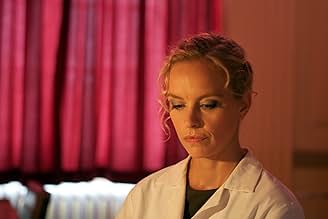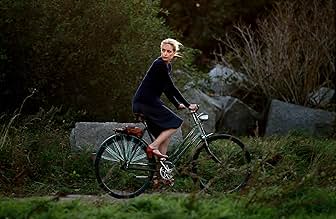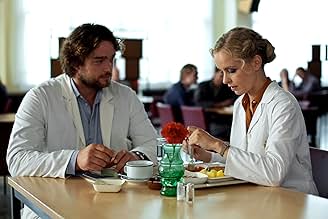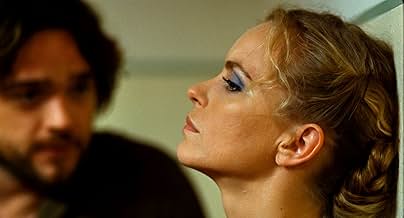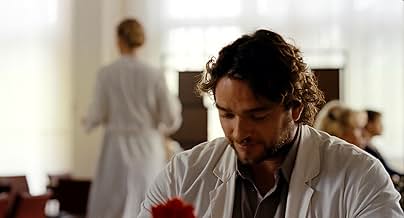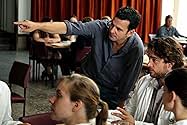IMDb-BEWERTUNG
7,2/10
16.672
IHRE BEWERTUNG
Eine Ärztin in der DDR der 80-er Jahre ist in einer kleinen Klinik auf dem Land gestrandet.Eine Ärztin in der DDR der 80-er Jahre ist in einer kleinen Klinik auf dem Land gestrandet.Eine Ärztin in der DDR der 80-er Jahre ist in einer kleinen Klinik auf dem Land gestrandet.
- Regie
- Drehbuch
- Hauptbesetzung
- Auszeichnungen
- 10 Gewinne & 24 Nominierungen insgesamt
Claudia Geisler-Bading
- Stationsschwester Schlösser
- (as Claudia Geisler)
Empfohlene Bewertungen
The story is set in East Germany in 1980, when it looked like Communism would last forever. Central character is Dr. Barbara Wolff, played by the classically beautiful blonde Nina Hoss, who I've previously seen in A Woman In Berlin. Dr. Wolff was a fast track young doctor at the Charite, the big teaching hospital in Berlin, before she fell in love with a West German businessman and applied for an exit visa. That got her a short spell in prison for ingratitude to the workers and farmers who paid for her medical education, together with a transfer to a one horse town in Mecklenburg, where she seems to be the second doctor in a two doctor pediatric clinic. We know all this because, as she is getting off the bus, the local Stasi man is going through her file with Andre, the head doctor at the clinic. Andre is what they used to call an Inoffiziale Mitarbeiter, or unofficial cooperator. We find out why later on. He's also an attractive, shambling 30 something bachelor in a kind of teddy bear way, a skilled, dedicated doctor with a good bedside manner, and, notwithstanding his work as an informer, a pretty decent guy by the standards of the time and place.
Barbara twigs immediately that Andre's an informer when he offers her a lift home from work on the first day. As they drive through an intersection in his piece of crap Trabant, she says, "you were supposed to ask me which way to turn, but then, you already know where I live." She is resentful, understandably so, and standoffish, which the clinic staff put down to stuck up Berlin attitude. That may have something to do with the open surveillance by the Stasi guy and regular searches of her apartment, complete with strip searches by a female agent. But Barbara is also a first class doctor who takes a real interest in her patients. Andre is quietly smitten -- if you've seen Hoss you'll know why -- and keeps chipping away at her resistance. Despite knowing who else he works for, she can't help responding.
What neither Andre nor the Stasi agent know is that Barbara is contriving to meet her Wessi boyfriend when he's in the East on business, and they're scheming to smuggle her out. He's crazy about her, even saying that he'd move East if she wants, but there are slight intimations that life in the West with him might not be exactly as she's dreamed of. In any event, there's a lot of sneaking about, and Hoss has a good line in tense body language and over the shoulder glances. Everybody knows everybody's business in a small town anyway, and in a small town in Mecklenburg, your landlady, your co-workers, or anyone you pass on the street could be an informer.
Complications ensue, involving Andre, the escape plan, and Barbara's obligations to two young patients in whom she has taken a special interest. I won't tell you how they play out, except that nothing goes quite as expected. The movie gives you a very good sense of a society in which everyone is compromised in some way, trust and intimacy are not really possible, but life has to go on nevertheless. It's not as showy as The Lives of Others, but it gives a better sense of what everyday life was like in the German Democratic Republic, where it has been estimated that there was one Stasi employee for every 165 citizens and one informer for every 6.5.
Barbara twigs immediately that Andre's an informer when he offers her a lift home from work on the first day. As they drive through an intersection in his piece of crap Trabant, she says, "you were supposed to ask me which way to turn, but then, you already know where I live." She is resentful, understandably so, and standoffish, which the clinic staff put down to stuck up Berlin attitude. That may have something to do with the open surveillance by the Stasi guy and regular searches of her apartment, complete with strip searches by a female agent. But Barbara is also a first class doctor who takes a real interest in her patients. Andre is quietly smitten -- if you've seen Hoss you'll know why -- and keeps chipping away at her resistance. Despite knowing who else he works for, she can't help responding.
What neither Andre nor the Stasi agent know is that Barbara is contriving to meet her Wessi boyfriend when he's in the East on business, and they're scheming to smuggle her out. He's crazy about her, even saying that he'd move East if she wants, but there are slight intimations that life in the West with him might not be exactly as she's dreamed of. In any event, there's a lot of sneaking about, and Hoss has a good line in tense body language and over the shoulder glances. Everybody knows everybody's business in a small town anyway, and in a small town in Mecklenburg, your landlady, your co-workers, or anyone you pass on the street could be an informer.
Complications ensue, involving Andre, the escape plan, and Barbara's obligations to two young patients in whom she has taken a special interest. I won't tell you how they play out, except that nothing goes quite as expected. The movie gives you a very good sense of a society in which everyone is compromised in some way, trust and intimacy are not really possible, but life has to go on nevertheless. It's not as showy as The Lives of Others, but it gives a better sense of what everyday life was like in the German Democratic Republic, where it has been estimated that there was one Stasi employee for every 165 citizens and one informer for every 6.5.
This year's Oscar entry from Germany is an edgy political thriller set in East Germany of 80s.
Nina Hoss plays the titular role. She is a doctor from Berlin banished to work in a small hospital in the provinces as punishment for her attempts to emigrate to the West.. Despite being choked by the omnipresent & omniscient secret police - Stasi - & surrounded by people she cannot trust, Nina Hoss brilliantly personifies a defiance that is as resilient as it is understated.
The movie is almost completely devoid of any background score. But, the silences, natural sounds, even the door bell ringing & clock ticking have been used to such great effect to underline the oppressive existence.
A tour de force in film-making !
Nina Hoss plays the titular role. She is a doctor from Berlin banished to work in a small hospital in the provinces as punishment for her attempts to emigrate to the West.. Despite being choked by the omnipresent & omniscient secret police - Stasi - & surrounded by people she cannot trust, Nina Hoss brilliantly personifies a defiance that is as resilient as it is understated.
The movie is almost completely devoid of any background score. But, the silences, natural sounds, even the door bell ringing & clock ticking have been used to such great effect to underline the oppressive existence.
A tour de force in film-making !
Yes, I worked in the old DDR. Living in London, and being a graduate engineer able to speak German, I was hired by a company importing machinery from the DDR to be their liaison man at the factory in East Berlin, and spent a number of lengthy periods over there in the late 60s and early 70s. I very much settled into working life there, and would socialise with the other engineers at the factory. I even had a local girlfriend for a while!
I recall the mindless bureaucracy, the often petty limitations on what everyone could do, and of course the ubiquitous police presence. In order to have my car to get around during these long tours of duty, I would usually take the ferry and drive there, and on one occasion I got harangued by a cop who told me my car was too dirty and that having a dirty car was strictly forbidden in the DDR!!
This movie depicts an era a decade later, and some things had changed. I remember many older people expressing considerable enthusiasm for their 'socialist utopia', largely because they felt their lives were massively better than under the Nazis and during the war years. But there was also a rising generation who wanted what people in the west had, a desire which had a particularly curious form of expression in Levi jeans! These were like gold dust, and sometimes at weekends I would pop through Checkpoint Charlie into West Berlin, and buy half a dozen pairs to give to my friends. Barbara and André were very much of that generation, Schütz was distinctly of the old guard.
So for me, the movie played out against a familiar background, and the agonising personal decisions this forced upon the central characters had great reality. Both Barbara and André were portrayed very much as caring doctors, placed in intolerable situations by the heavy and unfeeling hand of the state. The movie very cleverly kept us all in the dark, as we speculated how it might end. Well worth watching to find out!
10yagian
I visited Eastern Europe, Berlin, Prague, and Budapest, in March 1990. At that time, the Berlin Wall had already been fallen down, but Germany had not reunited yet.
People could freely come and go over the borders between East and West Germany. I went through Checkpoint Charlie to East Berlin, and I visited retro-future TV tower and saw Ladas running on street.
In a night train from Berlin to Prague, I asked a passenger who sat next to me if Germany would reunite in a year, and he answered that he didn't believe it would happen so early. In fact, Germany reunited in October 1990.
Although I actually visited East Berlin, now, it is hardly for me to believe that the half of Germany was a communist state just twenty-three years ago.
--------------------
"Barbara" is a German film about people living in East Germany in 1980. Barbara is a female doctor, who was watched by the secret police.
It is one of the greatest German films that I have ever seen. There is no exaggeration and omission in this film. Every element in it is necessary, and I couldn't find that any things were unnecessary.
This film is very quiet, because there is no background music. That makes audience concentrated in every tiny sound. Barbara was always nervous about the secret police, so she got surprised when the doorbell started to ring, and the audience also got really surprised with the sound of the doorbell, and fully understood her emotion.
Nina Hoss, as Barbara, was also great and attractive. She didn't overplay at all, but accurately expressed how Barbara felt in her mind. After seeing her performance, most actors and actress became to look unnatural.
This film is a quiet, simple, and elegant. If you love films, I strongly recommend you to see it.
People could freely come and go over the borders between East and West Germany. I went through Checkpoint Charlie to East Berlin, and I visited retro-future TV tower and saw Ladas running on street.
In a night train from Berlin to Prague, I asked a passenger who sat next to me if Germany would reunite in a year, and he answered that he didn't believe it would happen so early. In fact, Germany reunited in October 1990.
Although I actually visited East Berlin, now, it is hardly for me to believe that the half of Germany was a communist state just twenty-three years ago.
--------------------
"Barbara" is a German film about people living in East Germany in 1980. Barbara is a female doctor, who was watched by the secret police.
It is one of the greatest German films that I have ever seen. There is no exaggeration and omission in this film. Every element in it is necessary, and I couldn't find that any things were unnecessary.
This film is very quiet, because there is no background music. That makes audience concentrated in every tiny sound. Barbara was always nervous about the secret police, so she got surprised when the doorbell started to ring, and the audience also got really surprised with the sound of the doorbell, and fully understood her emotion.
Nina Hoss, as Barbara, was also great and attractive. She didn't overplay at all, but accurately expressed how Barbara felt in her mind. After seeing her performance, most actors and actress became to look unnatural.
This film is a quiet, simple, and elegant. If you love films, I strongly recommend you to see it.
Looking back at 1980 East Germany director Christian Petzold conjures up a dreary Orwellian world of suppressed emotions, police state invasiveness and a simmering yearning for something better. The work of Cinematographer Hans Fromm creates an atmosphere of almost perpetual colorless twilight and Petzold's laconic scenes and long takes create a subtle but omnipresent feeling of oppression and paranoia.
In a beautifully understated performance Nina Hoss (Barbara) is a doctor whose desire to leave East Germany results in her being punished through relocation to a rural village clinic where she encounters clinic chief Ronald Zehrfeld (Dr. Reiser). Reiser appears to be sympathetic but she is reluctant to trust him. Jasna Fritzi Bauer is Stella a young girl who constantly escapes juvenile work camps seeking refuge at the clinic. Mark Waschke is Jorg a well-to-do foreigner who loves Barbara and offers to help her escape to Denmark where they can be together. Rainer Bock is a Stasi officer who periodically subjects Barbara to strip searches in an attempt to harass and prevent her from fleeing.
"Barbara" is a quiet character piece. It's a subtle, tense, humanistic drama not ideally suited for audiences of plot-driven pictures. Nina Hoss deserves serious consideration from the Academy as hers is one of the best performances by an actress this year.
In a beautifully understated performance Nina Hoss (Barbara) is a doctor whose desire to leave East Germany results in her being punished through relocation to a rural village clinic where she encounters clinic chief Ronald Zehrfeld (Dr. Reiser). Reiser appears to be sympathetic but she is reluctant to trust him. Jasna Fritzi Bauer is Stella a young girl who constantly escapes juvenile work camps seeking refuge at the clinic. Mark Waschke is Jorg a well-to-do foreigner who loves Barbara and offers to help her escape to Denmark where they can be together. Rainer Bock is a Stasi officer who periodically subjects Barbara to strip searches in an attempt to harass and prevent her from fleeing.
"Barbara" is a quiet character piece. It's a subtle, tense, humanistic drama not ideally suited for audiences of plot-driven pictures. Nina Hoss deserves serious consideration from the Academy as hers is one of the best performances by an actress this year.
WUSSTEST DU SCHON:
- WissenswertesThe Torgau workhouse to which Stella is sent is the Torgau Juvenile Detention Centre. The Centre, which ran from 1964 to 1989, was for the "re-education" of young people aged 14 to 18. Inmates had committed no crimes, but were deemed to need education so that they could fit in with the norms of socialist life in East Germany.
- PatzerAndre hands Barbara a cup of coffee, which she promptly drops. You see the shattered pieces of the cup on the floor, but no coffee.
- Zitate
André: Doctor Wolff will be working with us. She is from Berlin... from the Charite Hospital, and has decided...
Assistenzärztin Schulze: We have introduced ourselves.
- VerbindungenFollowed by Phoenix (2014)
- SoundtracksNocturne g-moll Opus 15 No. 3
Composed by Frédéric Chopin
Top-Auswahl
Melde dich zum Bewerten an und greife auf die Watchlist für personalisierte Empfehlungen zu.
- How long is Barbara?Powered by Alexa
Details
- Erscheinungsdatum
- Herkunftsland
- Offizielle Standorte
- Sprache
- Auch bekannt als
- Bárbara
- Drehorte
- Produktionsfirmen
- Weitere beteiligte Unternehmen bei IMDbPro anzeigen
Box Office
- Bruttoertrag in den USA und Kanada
- 1.013.902 $
- Eröffnungswochenende in den USA und in Kanada
- 63.410 $
- 23. Dez. 2012
- Weltweiter Bruttoertrag
- 6.908.277 $
- Laufzeit1 Stunde 45 Minuten
- Farbe
- Sound-Mix
- Seitenverhältnis
- 1.85 : 1
Zu dieser Seite beitragen
Bearbeitung vorschlagen oder fehlenden Inhalt hinzufügen




